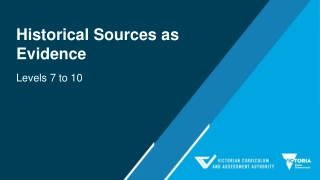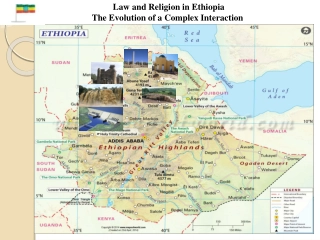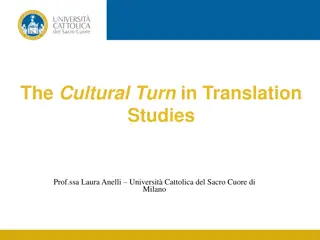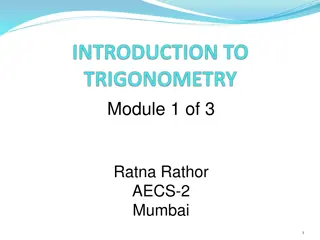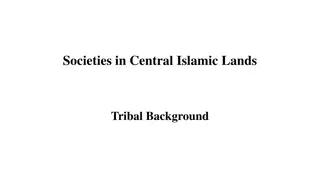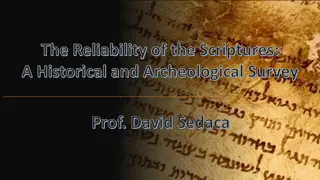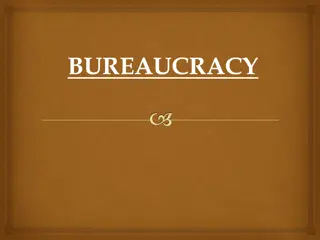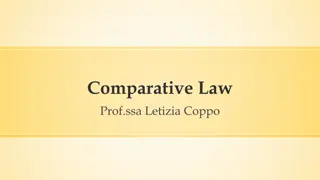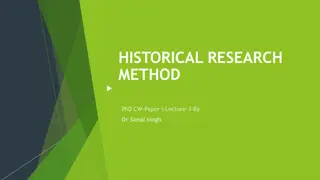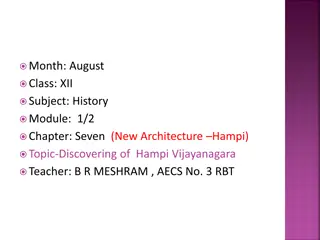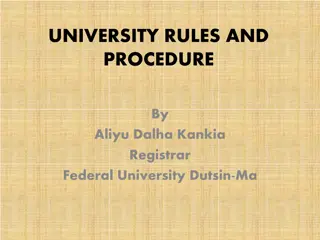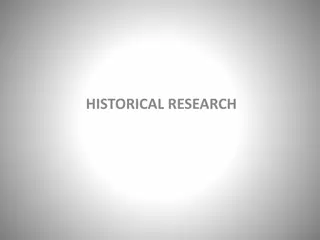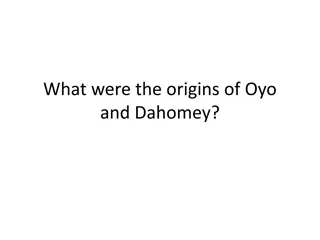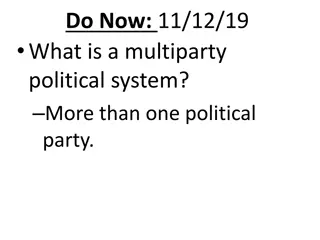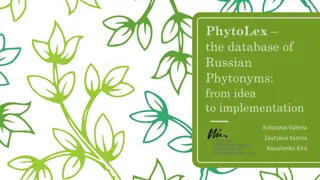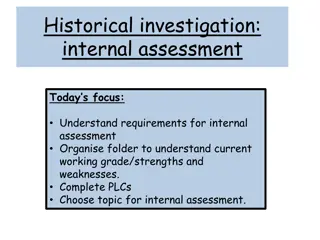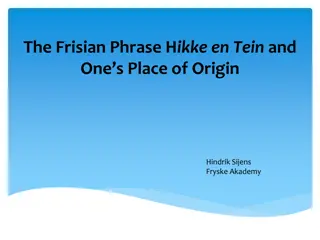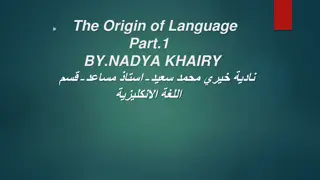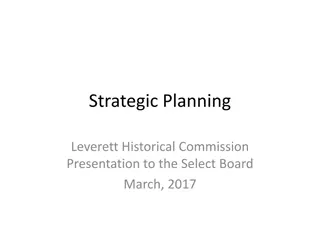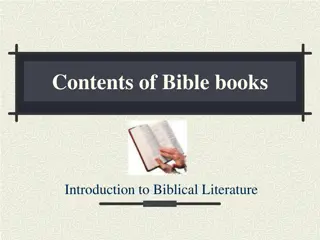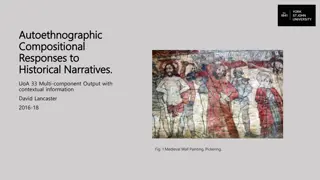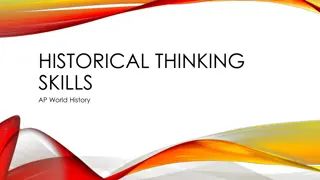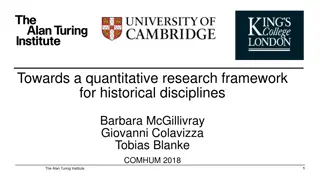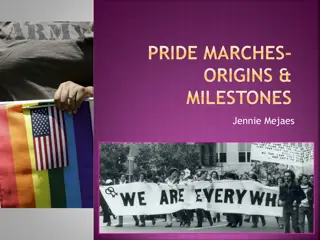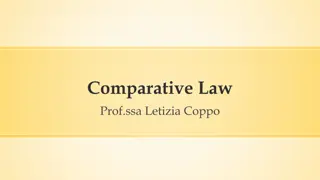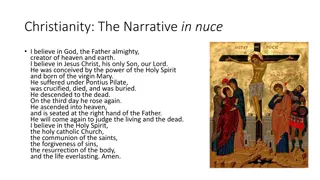Understanding HTML/CSS: Basics and Origins
HTML (HyperText Markup Language) and CSS (Cascading Style Sheets) are fundamental programming languages used in web development. HTML provides the structure of a website, while CSS is used for formatting and styling. This article delves into the origins of HTML, its evolution, the basics of HTML and
3 views • 24 slides
Historical Sources as Evidence
Explore the importance of historical sources as evidence in the Victorian Curriculum History context, focusing on how students analyze, evaluate, and utilize sources to create historical explanations and arguments. Discover the significance of primary and secondary sources, perspectives of historica
1 views • 46 slides
Law and Religion in Ethiopia: A Historical Overview
Explore the evolution of the complex interaction between law and religion in Ethiopia, from Imperial Ethiopia to the Communist Era and the post-communist period. Discover the rich historical origins of Ethiopia, including its diverse religious landscape and unique governance structures. Delve into t
0 views • 28 slides
Unraveling the Big Bang Theory and the Origins of the Universe
Explanation of the Big Bang Theory by Matthew Kogan, detailing the formation of the universe from a hot, dense mass expanding outward. As the universe cooled, particles formed, leading to the creation of stars and galaxies. The theory explores the imbalance between matter and antimatter, the intense
5 views • 12 slides
Exploring Chumash Culture: Language, Naming, and Origins
Dive into the rich heritage of the Chumash people, learning about their language, the meaning behind their name, and the fascinating elements that make up their cultural identity. Discover the origins of the Chumash name, explore their unique vowel sounds, and even create your own Chumash-inspired n
3 views • 7 slides
Understanding Translation Studies: From Origins to Cultural Turn
The exploration of translation studies, from its historical roots to the modern cultural turn, delves into the essence of translation, its typologies according to Jakobson, the role of translators through historical perspectives from Cicero to modern times, and insights from Dryden and Schleiermache
2 views • 38 slides
Challenges and Solutions in Implementing Historical Competencies in Teaching
Explore the complexities and obstacles faced in implementing historical competencies in teaching, as discussed by Jens Aage Poulsen, a senior lecturer and researcher at HistoryLab, University College Lillebaelt, Denmark. The content delves into competence-based curriculum, core historical competenci
0 views • 7 slides
Understanding Trigonometry: A Comprehensive Overview
Delve into the world of trigonometry with this detailed guide covering the origins, applications in real life, historical significance, and key objectives to empower you with the knowledge of trigonometric ratios and identities. Discover how this branch of mathematics plays a crucial role in measuri
1 views • 22 slides
Origins and Tribes of Central Islamic Lands: A Historical Overview
Explore the origins of Jewish tribes in Saudi Arabia, the diverse tribal backgrounds in Central Islamic lands, and the cultural landscape of pre-Islamic societies in the Arabian Peninsula. Discover the ancient civilizations, dominant tribes, and sources of historical evidence that shed light on the
0 views • 23 slides
Understanding the Historical and Archaeological Aspects of the Scriptures
Delve into the reliability of the Scriptures through a historical and archaeological survey. Explore the origins of the Bible, the concept of the Holy Scriptures, the Canon formation, and the structure of the Hebrew Bible and its various sections like the Torah, Prophets, and Writings.
2 views • 20 slides
Understanding Bureaucracy: Origins, Meanings, and Key Features
Bureaucracy, derived from the Latin term 'bureau', has evolved to represent a system of officials in power within public administration. This article explores the origins of the term, its various interpretations, and key features such as hierarchy, chain of command, and adherence to rules and regula
3 views • 34 slides
Understanding Bureaucracy: Origins, Functions, and Myths
Explore the concept of bureaucracy, tracing its origins and elements according to Max Weber's analysis. Discover the evolution from patronage to the merit-based system and debunk common bureaucratic myths prevalent in society. Gain insights into the role of civil servants and the intricate workings
4 views • 54 slides
Evolution of North American Law: From Common Law to Unique Legal Tradition
The historical origins of North American law trace back to the early 17th century, marked by the influence of English common law on the colonies. Over time, the American legal system evolved, absorbing elements from both the English legal tradition and local statutes. The development of the United S
0 views • 19 slides
Historical Origins and Formation of German Law: Influence of Roman Law
The historical origins and formation of German law were shaped significantly by the late contact with Roman law during the Medieval and Renaissance period. The weak central imperial power, rising influence of territorial rulers, and the lack of a common legal system in Germany prompted the appeal fo
0 views • 23 slides
Understanding Historical Research Methods
Historical research is a systematic approach to investigating past events, developments, and experiences. It involves critical examination of evidence, interpretation of sources, and tracing of historical trends to gain insights into social changes. Various definitions by scholars like Kerlinger, Wh
1 views • 21 slides
Discovering the Rich History of Hampi: A Glimpse into the Vijayanagara Empire
Hampi, also known as Vijayanagara, holds the remnants of a once grand empire founded in the 14th century. The discovery of this historical site in 1800 by Colonel Colin Mackenzie marked the beginning of unveiling its treasures. From its origins under Harihara I and Bukka I to the golden era under Kr
0 views • 18 slides
Evolution of Universities in Europe: A Historical Perspective
Here, we delve into the origins and development of universities in Europe, tracing back to the Middle Ages when institutions of higher learning emerged under various influences such as the Catholic Church and monarchs. The discussion highlights the transformation of cathedral schools into the first
1 views • 14 slides
Understanding Historical Research: Methods, Purposes, and Aims
Historical research involves investigating past events systematically to provide a dynamic explanation, interpretation, and understanding of the past. It aims to uncover unknown aspects, answer unexplored questions, and link past happenings to the present to enrich human culture and encourage interd
0 views • 20 slides
Origins and Development of Oyo and Dahomey Kingdoms
Origins and early development of the Oyo and Dahomey kingdoms located in modern-day Benin and Nigeria. Oyo, a Yoruba kingdom, had roots in Ile-Ife and emerged as a regional power through trade and military prowess. Dahomey, an Aja kingdom, rose in the 18th century with influences from Yoruba traditi
3 views • 11 slides
Understanding the Sources of Law: Definitions and Classification
The term "sources of law" refers to the origins from which rules of human conduct derive their legal force and binding character. This concept varies among writers and includes factors like Hindu scriptures, sovereign authority, historical documents, customs, and more. This article explores differen
0 views • 11 slides
Responsibilities Towards God: A Reflection on Origins and Service
Exploring our obligations to God, considerations on what to withhold, and the importance of serving by all means. Delve into the origins of violence in daily life and towards historical legacies devoid of meaning.
0 views • 97 slides
Evolution of the American Political Landscape: A Historical Overview
Explore the development of the multiparty political system in the United States through the origins of the Democratic and Republican parties, tracing back to historical figures like Thomas Jefferson, James Madison, and Abraham Lincoln. Dive into the ideological spectrum, party histories, presidentia
0 views • 32 slides
Uncovering Russian Plant Names: PhytoLex Database Project
The PhytoLex database project aims to collect and analyze Russian plant names from historical texts, shedding light on their origins, meanings, and cultural significance. By exploring old manuscripts and dictionaries, the project seeks to bridge gaps in knowledge and enhance understanding of plant n
0 views • 27 slides
Reevaluating Christmas: Origins and Traditions Examined
As we approach the holiday season, questions may arise about the true origins and traditions of Christmas. This article delves into the historical background and misconceptions surrounding the celebration, exploring whether it aligns with Christian beliefs and practices. Discover the origins of Dece
0 views • 26 slides
Historical Perspectives on Worshiping and Praising God
Explore the historical perspective of worshiping and praising God, tracing back to the origins and evolution of musical instruments in religious worship. Discover insights from notable scholars and influential religious leaders, alongside reflections on the use of instruments in the Old Testament, p
0 views • 27 slides
Requirements for Historical Investigation Internal Assessment
Understand the 25% weightage internal assessment comprising 3 sections for a historical investigation. Focus on source evaluation, investigation, and reflection within a 2,200-word limit. Choose a historical topic, analyze primary and secondary sources, and consider causation, consequence, continuit
0 views • 18 slides
Understanding Historical Context in Skills Development Discourses
Exploring the evolution of apprenticeship and skills development through historical sociology, historical futures, modes of justification, and complexity concepts. Emphasizing the importance of nuanced historical understanding to navigate contemporary challenges in South Africa's skills development
0 views • 29 slides
Unraveling the Frisian Phrase "Hikke en Tein" and Its Origins
Explore the intriguing Frisian phrase "Hikke en Tein" and its rich cultural significance. Delve into its origins in Tytsjerksteradiel and the interpretations related to birthing, procreation, and movement. Uncover the various dimensions of this phrase through historical references and linguistic ana
0 views • 8 slides
Democracy and Imperialism: Origins and Legacy of Classical Athens
The module explores the origins, nature, and legacy of democracy in Classical Athens (508-322 BC), shedding light on the political structures, principles, and impact of Athenian democracy. Topics range from the supreme authority of the Assembly to the accountability of magistrates, providing insight
0 views • 16 slides
Exploring the Origins of Language: Divine, Natural, and Experiential Sources
Delve into the fascinating exploration of the origins of language, examining theories including divine origins as gifts from gods, natural sound sources through onomatopoeia, genetic influences, and experimental attempts to uncover language's beginnings. Discover intriguing insights into the diverse
0 views • 8 slides
The Fascinating History of Halloween: Origins, Traditions, and Connections
Halloween, originally known as All Hallows' Eve, has evolved from a celebration of evil spirits to a fun-filled day where children don costumes and go trick-or-treating. Learn about the origins of Halloween, its symbolism with witches and black cats, and the connection between Salem and the Salem Wi
0 views • 14 slides
Leverett Historical Commission Strategic Planning Presentation Overview
Leverett Historical Commission identifies issues with ad hoc requests, lack of clarity on historical property significance, and inadequate maintenance plans. A strategic plan is needed to define assets, determine significance, create guidelines, prioritize restoration efforts, and establish funding
0 views • 9 slides
Introduction to Historical Books of the Bible: Genesis to Joshua
The historical books of the Bible, from Genesis to Joshua, cover events like creation, the exodus from Egypt, the giving of the Ten Commandments, and the conquest of the Promised Land. These books provide a foundational understanding of the origins and history of the Jewish people, incorporating key
0 views • 43 slides
Exploring Historical Narratives through Music and Art
This submission presents two original compositions that delve into historical narratives through a unique blend of music and visual art. The compositions aim to reinterpret stories from the past, creating innovative structures and forms. By intertwining various perspectives and utilizing cinematic t
0 views • 8 slides
Historical Source Analysis Exam Questions Overview
The provided content outlines exam questions related to historical sources, guiding students on analyzing, evaluating, and interpreting information from different sources. The questions cover a range of topics such as learning from sources, assessing accuracy, understanding significance, and making
0 views • 12 slides
Developing Historical Thinking Skills in AP World History
AP History classes aim to cultivate apprentice historians by fostering historical thinking skills (HTS). These skills include Chronological Reasoning, Comparison and Contextualization, Crafting Historical Arguments, and Historical Interpretation. Each skill set equips students with the ability to an
0 views • 15 slides
Quantitative Research Framework for Historical Disciplines
Scholarly communities in historical disciplines are combining quantitative and qualitative methods to study phenomena that change over time. The proposed general methodological reflection aims to enhance research in historical linguistics through quantitatively driven models and claims. Quantitative
0 views • 18 slides
Evolution of LGBTQ+ Pride: From Origins to Milestones
Discover the historical origins and significant milestones of LGBTQ+ pride marches, from the Christopher Street Day Liberation March of 1970 after Stonewall to the First National March on Washington in 1979 for LGBT rights, up to the New York Gay Pride Parade in 2011 following the legalization of sa
0 views • 9 slides
Evolution of English Law: Historical Origins and Formation
The historical origins and formation of English law trace back to the Medieval period, characterized by Norman conquest, feudalism, and a strong central royal authority. The organization of the judiciary system and the development of procedural rules played pivotal roles in shaping English law. The
0 views • 30 slides
Overview of Christianity: From its Origins to Historical Developments
Explore the foundational beliefs of Christianity, from the belief in God and Jesus Christ to the role of the Holy Spirit. Delve into the significance of Scripture, the rise of the Imperial Papacy, Church and Feudalism, Monasticism, and historical events like the Black Death and the Investiture Contr
0 views • 11 slides

